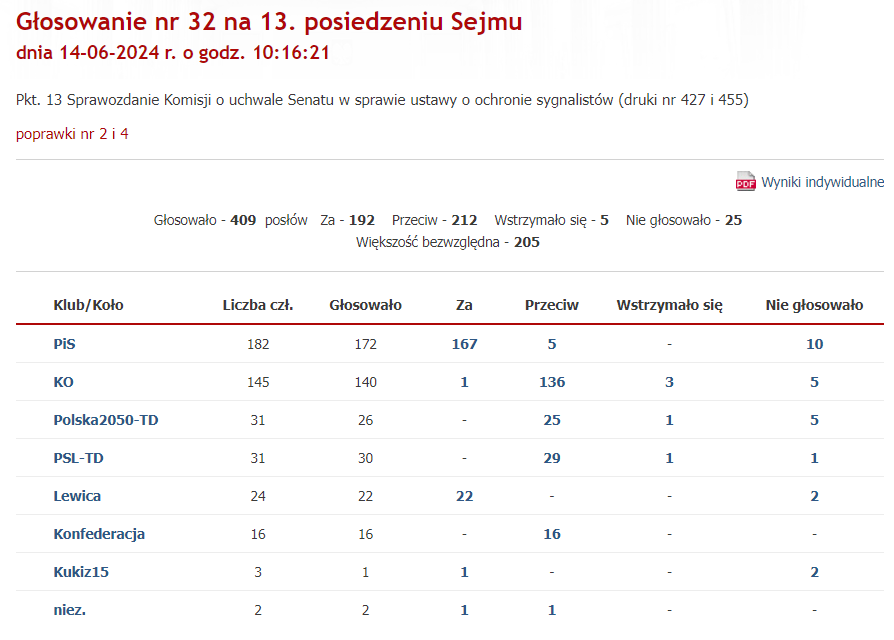The left-wing junior partner in Poland’s ruling coalition has expressed frustration after parliament removed labour violations from a list of areas covered by a new law intended to protect whistleblowers.
The bill was today passed by parliament after the other two groups in the ruling coalition, which hail from the centre and centre-right, were joined by the far-right in voting to exclude labour violations.
The left-wing labour minister, Agnieszka Dziemianowicz-Bąk, criticised the measures and claimed that the law will now provide “pigs with more protection than Polish workers” as animal welfare is included but not labour violations.
💬 Ministra @AgaBak podczas wystąpienia w #Sejm: Rządowy projekt ustawy o ochronie sygnalistów miał pomóc ratować życie i zdrowie pracowników, chronić ich rodziny przed życiowymi tragediami. W katalogu naruszeń, za zgłoszenie których ma przysługiwać ochrona sygnalistów,… pic.twitter.com/Mz1QjDit7Z
— Ministerstwo Rodziny, Pracy i Polityki Społecznej (@MRPiPS_GOV__PL) June 14, 2024
The law in question is designed to implement a European Union directive on the protection of whistleblowers – that is, those who report illegal activity within an organisation.
The legislation initially included labour-law violations when it was approved by the government and the Sejm, the more powerful lower house of parliament. However, last week, the upper-house Senate passed an amendment that removed protection of people reporting violations of labour law.
It did so after business groups expressed opposition to the measure. But the decision was criticised by unions, NGOs and also by Dziemianowicz-Bąk, who comes from The Left (Lewica), which is the smallest member of Poland’s ruling coalition.
However, supporters of the amendment in the Senate argued that the National Labour Inspectorate (PIP), a state body, is already responsible for overseeing compliance with labour law, meaning there was no need for this to be included in the newly proposed legislation.
Senat RP wykreślił z projektu ustawy o ochronie sygnalistów prawo pracy. W wyniku tej zmiany ustawa nie będzie chronić sygnalistów zgłaszających naruszenia prawa pracy, które, jak pokazuje praktyka, mogą mieć istotne znaczenie dla bezpieczeństwa i zdrowia obywateli. Organizacje… pic.twitter.com/03QAG4sPZb
— Helsińska Fundacja Praw Człowieka (@hfhrpl) June 11, 2024
Today, the Senate’s amendment was voted on in the Sejm, which can overturn decisions made by the upper house. However, a majority of 212 MPs voted to keep the amendment, with only 192 against it.
The votes in favour of the amendment came largely from the centrist Civic Platform (PO) – the main ruling party – and the centre-right Third Way (Trzecia Droga), which is also part of the governing coalition.
However, they were also joined by 16 MPs from the far-right opposition Confederation (Konfederacja) party – which favours a business-friendly economic policy – and by five MPs from the caucus of the national-conservative Law and Justice (PiS) party, which is the main opposition.
Those five latter votes came from members of Sovereign Poland (Suwerenna Polska), a small hard-right party allied to PiS. The vast majority of the PiS caucus voted against the amendment, along with all MPs from The Left who were present.

How MPs in the Sejm voted on the amendment excluding labour law from the whistleblower act (za = for rejecting it, przeciw = against rejecting it, wstyzmało się = abstained, nie głosowało = did not vote)
Speaking in parliament today, Dziemianowicz-Bąk strongly criticised the amendment. She noted that around 200 people die in workplace accidents in Poland each year.
This happens “because in some factory, construction site or plant, someone wanted to save on safety, and someone else was afraid to report it because they were afraid of losing their job or having their salary reduced”, she declared.
Without the labour-law provisions of the act, “an absurd situation has arisen” in which the rules “protect pigs more than Polish workers”, said the minister. “Reports of violations of feed safety or animal welfare will – and rightly so – be covered by the act, but reporting a threat to an employee’s health and life will not.”
A number of NGOs, including the Helsinki Foundation for Human Rights and the Batory Foundation, had also urged MPs to vote to maintain labour-law protections in the legislation.
📣 Ustawa o ochronie sygnalistów miała pomóc ratować życie i zdrowie pracowników, chronić ich rodziny przed życiowymi tragediami. Projekt po poprawce Senatu bardziej chroni trzodę chlewną niż polskiego pracownika! – ministra @AgaBak pic.twitter.com/IGaQy2YP3O
— Lewica (@__Lewica) June 14, 2024
Today’s vote means that the whistleblower act as a whole, including the amendment excluding labour-law violations, has now been approved by parliament. It passes to President Andrzej Duda, a PiS ally, who can sign it into law, veto it, or pass it to the constitutional court for assessment.
If signed into law, the legislation will establish channels for employers to report wrongdoing at their organisation and provide protections for those who do so.
Areas of activity covered by the proposed law include corruption, public procurement, financial services, product safety and compliance, environmental protection, food and feed safety, animal health and welfare, and protection of privacy and personal data, reports financial news service Money.pl.
Poland was, like other member states, supposed to have transposed the EU’s whistleblower directive into national law by 17 December 2021. It remains the only EU country not yet to have done so.
Final EU member state #Poland has adopted legislation to transpose the EU Directive on #whistleblower protection! 🎉 Passed in 2019, transposition has faced delays – focus now on implementation! #EUWhistleblowingMonitor
Visit https://t.co/Q7btUoIP5V pic.twitter.com/oKoFyUizXS— WIN (@whistleblowing) June 14, 2024

Notes from Poland is run by a small editorial team and published by an independent, non-profit foundation that is funded through donations from our readers. We cannot do what we do without your support.
Main image credit: Mateusz Włodarczyk/MRPiPS (under CC BY-NC-ND 2.0)

Daniel Tilles is editor-in-chief of Notes from Poland. He has written on Polish affairs for a wide range of publications, including Foreign Policy, POLITICO Europe, EUobserver and Dziennik Gazeta Prawna.



















